The Netherlands is a great place to live. So, now that you’re considering a move to Holland — or have already decided to start a new life in the land of cheese, windmills, and bikes — the next question is: “Where in the Netherlands should you live?”
Whilst in other countries, where you choose to live is often dictated by where you work, the Netherlands’ small size and great public transport connections make it possible, and very common, to live in one city or village and work in another.
The Netherlands also has options for everyone, from families to job-seekers, to those in search of an adventure. So, where is the right place for you to live in the Netherlands? Here’s a full breakdown of the Dutch cities that attract the most internationals.
The most popular Dutch cities to live in for internationals
Let’s start with a quick lowdown of essential (but easy!) Dutch geography: the Netherlands is basically divided into two main areas: the Randstad, and the rest.
The Randstad is a metropolitan area in the centre of the Netherlands, encompassing the country’s four largest cities: Amsterdam, Rotterdam, The Hague, and Utrecht, and their surrounding areas.
The Randstad is also the most popular part of the Netherlands for internationals to live in because of its:
- great connections to the rest of Europe,
- position as an economic and cultural hub,
- job possibilities (because many national and international companies have offices in these cities).
However, there are some other great places to live beyond the Randstad, like Groningen in the north of the country, and Maastricht in the south. These cities are increasingly attracting international companies and families — and with large student populations, they are lively places to be.
READ MORE | What your favourite Dutch city says about you
That being said, not all of the Netherlands is as progressive as the rest — and there are some places you might want to avoid. For example, the Dutch have their very own Bible Belt, where people tend to be more conservative and less open to welcoming expats.
Amsterdam: living in the Dutch capital
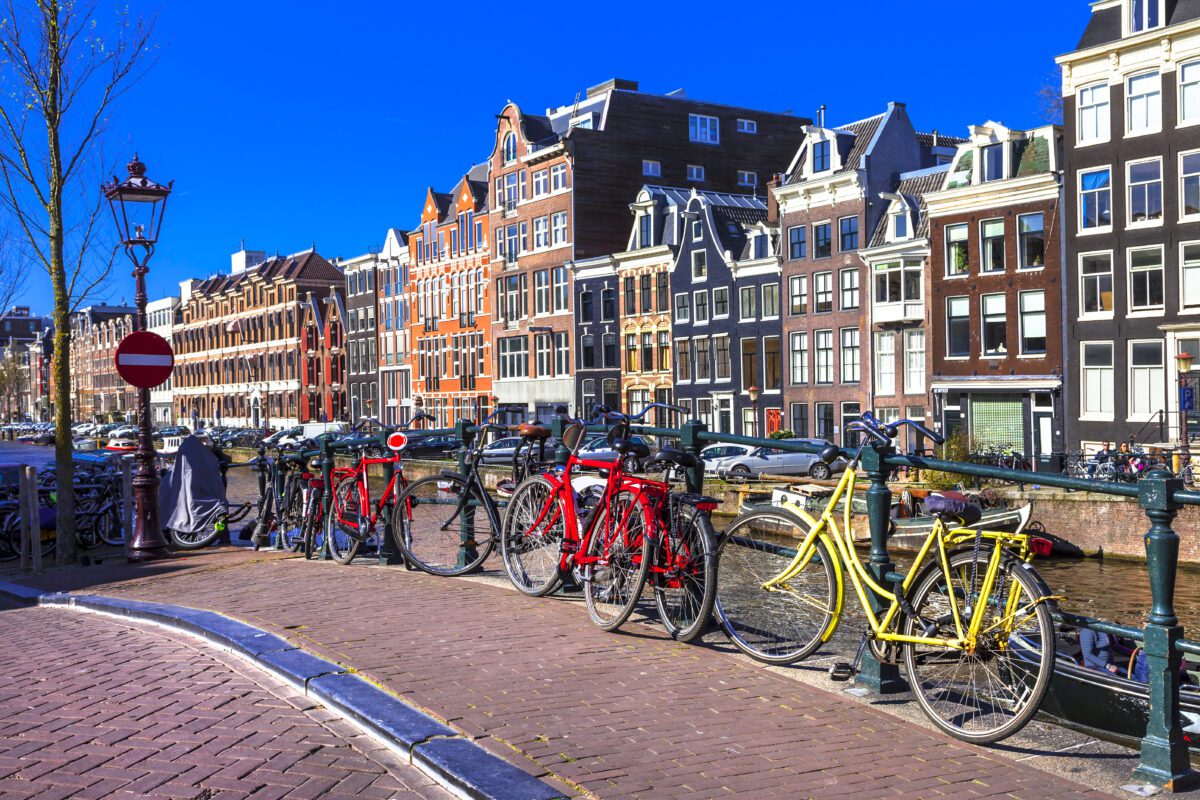
When you’re considering where to live in the Netherlands, Amsterdam could either be at the top, or at the bottom of your list. If you’ve ever wanted to walk out your front door and be greeted by picturesque canals and a historic centre, this could be the city for you.
READ MORE | Living in Amsterdam: the ultimate guide to Amsterdam life
People from over 180 nationalities call the Dutch capital their home, unable to resist the city’s international job opportunities, bike-ability, education, nearby airport, and plethora of green spaces.
While the city is jam-packed with world-class museums, entertainment, nightlife, and well serviced by public transport, the Dutch capital isn’t perfect.
READ MORE | Where to live in Amsterdam: the 2024 neighbourhood guide
The popularity of Amsterdam has sent housing prices skyrocketing and made the cost of living the highest of any Dutch city. Add to that the constant battle against over-tourism, and you may find yourself gravitating toward other Dutch cities instead.
Rotterdam: modern architecture and Europe’s largest port
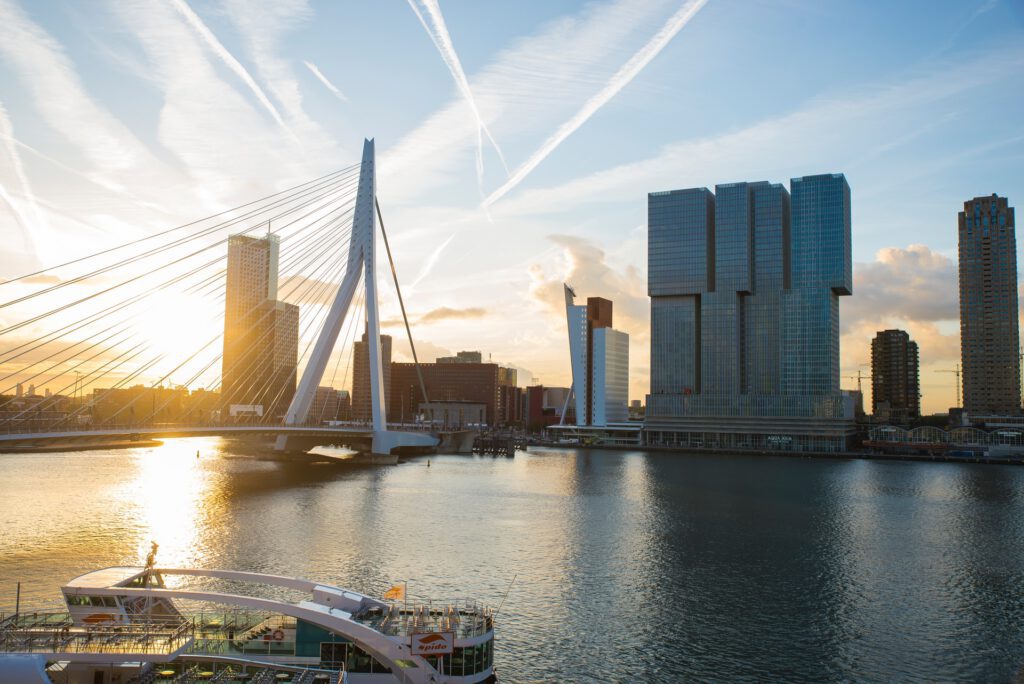
If modern high-rise buildings are your thing, then moving to Rotterdam might just be for you! The city is affectionately known as “Manhattan on the Meuse”, in strong contrast to the quaint Golden Age architecture found in the majority of other Dutch cities.
After being bombed by the Germans during World War II, Rotterdam was rebuilt and is now defined by cutting-edge architecture — think cube houses and clean lines.
Rotterdam is the second biggest city in the Netherlands and is home to Europe’s largest seaport. The port attracts workers from all over the world, making Rotterdam one of the most diverse cities in the Netherlands with a strong international community.
READ MORE | Moving to Rotterdam: what to know before making this futuristic Dutch city your home
Like any Dutch city, rental prices in the centre are on the steep side, and accommodation is scarce. Nevertheless, the cost of living in Rotterdam is rather low, compared to other big cities, such as Amsterdam, and there are more places to rent and buy in and around Rotterdam.
With a dynamic food scene, numerous green spaces, and the UNESCO World Heritage Site, Kinderdijk, close by, there’s plenty to keep you entertained.
The Hague: international organisations and a seaside town
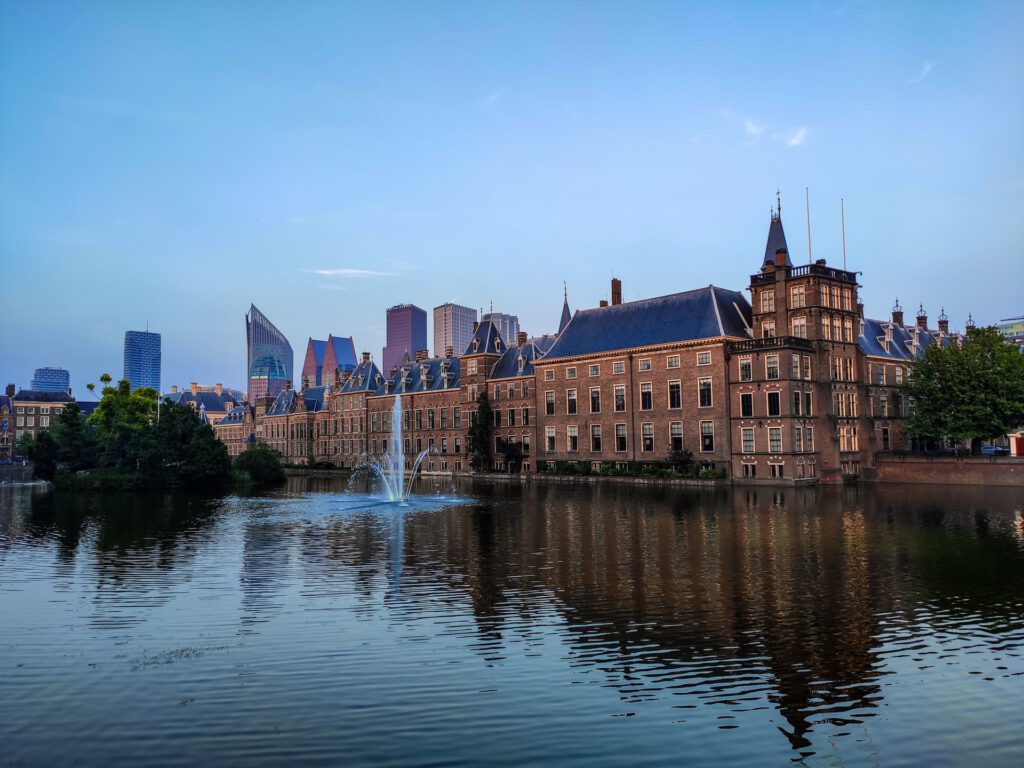
When deciding where to live in the Netherlands, the Hague is really the best of both worlds. Seamlessly blending a skyline of glistening high-rise buildings with abundant nature (like the seaside, or the Haagse Bos, a mature woodland that sits in the centre of The Hague), this influential city is truly mesmerising.
READ MORE | Moving to The Hague: the ultimate and complete guide
Thanks to its numerous embassies, and the fact that many important international organisations are based here, The Hague hosts a vibrant international community.
It’s also the political capital of the Netherlands, and the seat of the Dutch government. So, if you were hoping to bump into the Dutch Prime Minister, then The Hague is the place to be — you might ride past him on his cycle to work!
READ MORE | 7 things you didn’t know about The Hague
Scheveningen’s long sandy beach is another huge calling card for The Hague — from the city, you’re just a bike ride away from its iconic pier and vibey beach clubs. However, like most cities in the Randstad region, The Hague is experiencing a housing shortage, and rental prices are high. Nevertheless, it’s cheaper to live here than in Amsterdam or Utrecht.
Utrecht: small city with a big city vibe
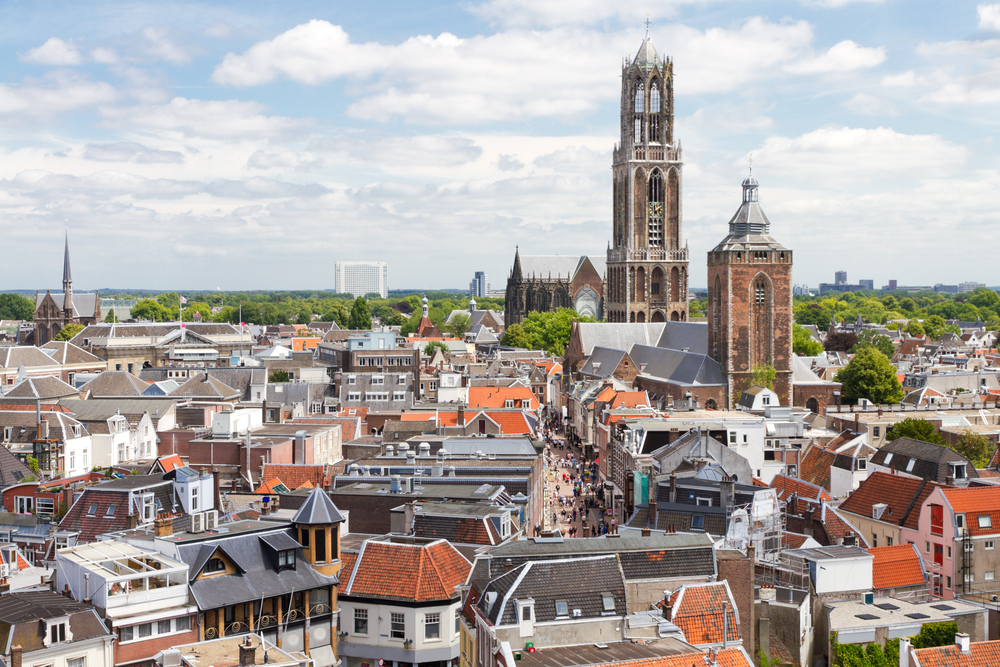
Once the religious capital of the Netherlands, this quaint, medieval city is centred around the Dom Tower — the tallest church tower in the Netherlands. With beautiful old houses, bridges, and canals all over the city, Utrecht is often regarded as a “little Amsterdam” — just with fewer tourists.
When I first came to Utrecht, I was blown away by its unique charm. Home to a world-renowned university, the city is vibrant and fun, yet compact and never overwhelming. Overall, Utrecht is a great place to live — so, when you’re deciding where to live in the Netherlands, be sure to consider this charming corner.
READ MORE | Moving to Utrecht: everything you need to know about living in Utrecht in 2022
There’s no shortage of interesting things to do and see in this historic city either. With a dynamic restaurant scene and loads of gezellige terraces along the Oudegracht and in the Neude square, Utrecht is a perfect city for evenings out. It also boasts the most cultural events in the Netherlands, after Amsterdam.
If you weren’t convinced yet, in 2012, Lonely Planet listed Utrecht in the top 10 of the world’s unsung places. 😉
While housing is both pricey and scarce in Utrecht, its central location makes it a good option for people who want to live somewhere central, that’s easily accessible from different cities.
Leiden: the city of knowledge
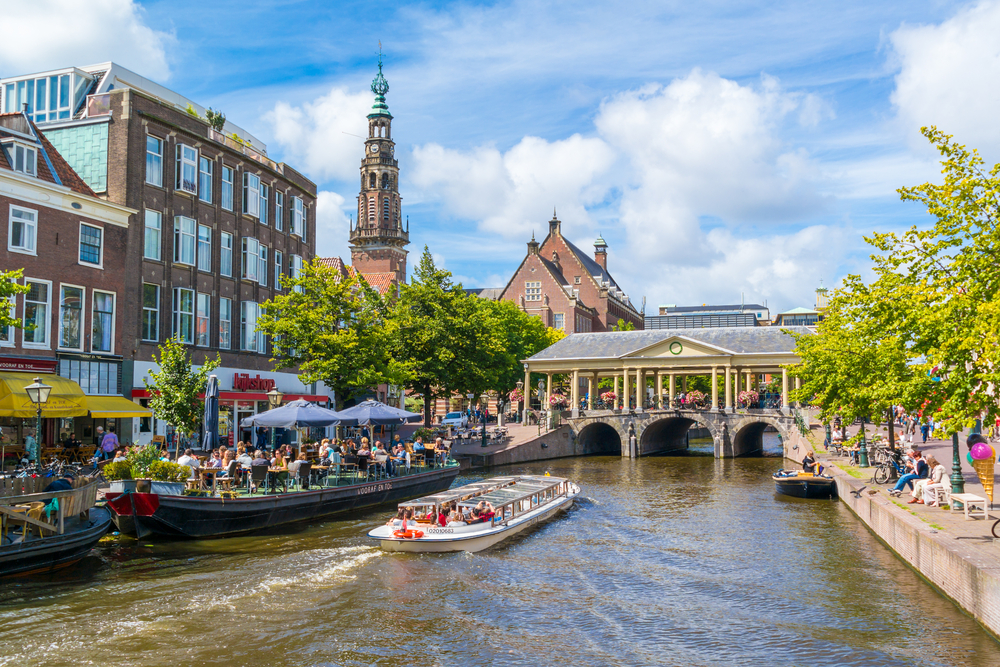
Located in the heart of the Randstad, Leiden is an ideal location for expats. The city is one of the oldest and most picturesque in the Netherlands — with romantic canals flanked by boats, and a windmill standing proudly along one of the main roads.
The city is quite compact, with just 127,000 inhabitants, but thanks to the presence of the prestigious Leiden University (the oldest in the Netherlands), it is a bustling student centre.
Leiden has a huge variety of cultural activities, with 15 museums in the city alone! The most popular are the Naturalis Biodiversity Center, a great option for kids, and the Museum De Lakenhal, which exhibits paintings by famous artists from Leiden, such as Rembrandt. There are also loads of cute bars, cafes and restaurants.
The city also lies in the “Bulb Region”, the best-known flower-growing area in the Netherlands. This makes it a perfect base for exploring the quintessentially Dutch tulip fields in spring.
Delft: a cocktail of innovation and history
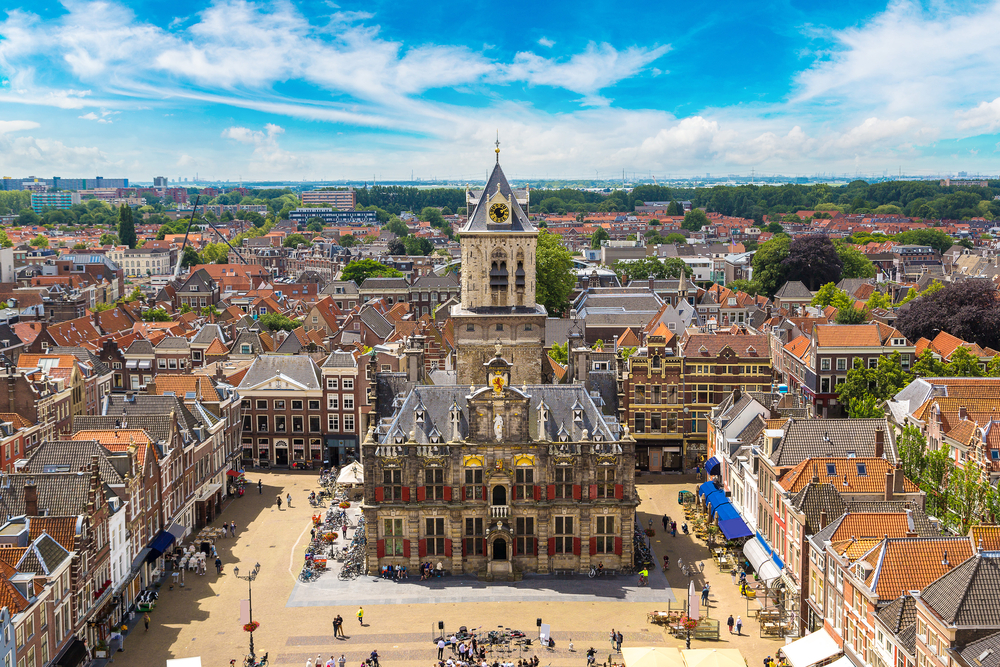
Delft is one of these cities where historic charm and modern-day technology blend together perfectly. Home to one of the most famous Dutch painters, Vermeer, it’s no surprise that this is one of the most picturesque cities in the whole Randstad. 🎨
READ MORE | Scenic Delft: 15 great photos to make you wanna visit
With countless museums, churches, restaurants, and beautiful canals, Delft is a vibrant city that has plenty to offer. Well-connected to cities like The Hague, Leiden, and Rotterdam, it’s also a perfect base for commuters who want to live in a city with a village-like charm.
That being said, Delft also has its own international job market. Home to the Delft University of Technology, the city is not just a pretty sight but also an important innovation hub of the Randstad. International students and expat workers make for a young, diverse population.
When it comes to housing, prices in Delft are lower than in some other cities in the Randstad — but renting and buying will still cost you a pretty penny.
Eindhoven: centre of technology and innovation
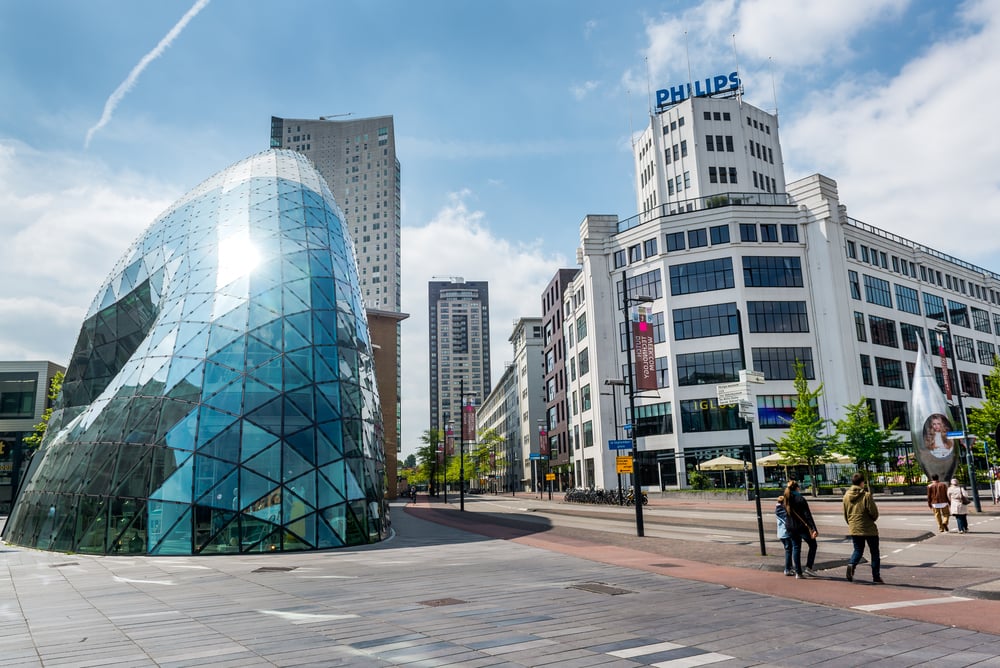
If you’re craving something more modern when deciding where to live in the Netherlands, then Eindhoven is just the place for you! Eindhoven may not be the most traditionally pretty city in the Netherlands, but it’s bursting with tech, energy, and innovation.
The city is all about progress, having been rebuilt after a considerable WWII bombing. It is now home to high-tech multinationals and startups — including the electronics giant, Philips. It’s no wonder Eindhoven is considered the Silicon Valley of the Netherlands!
READ MORE | 7 underrated places to live outside of the Randstad
Parks make up about one-third of all public space, making Eindhoven the greenest of the five major Dutch cities. It’s also home to the Stratumseind, the longest café- and bar street in the Netherlands — crowning Eindhoven as one of the best places to pub crawl.
Plus, if exploring Europe is on your to-do list, you’re in luck! Eindhoven Airport is the second busiest in the Netherlands, and is serviced by low-cost airlines, like Ryanair and Transavia.
Tilburg: edgy and fast-evolving
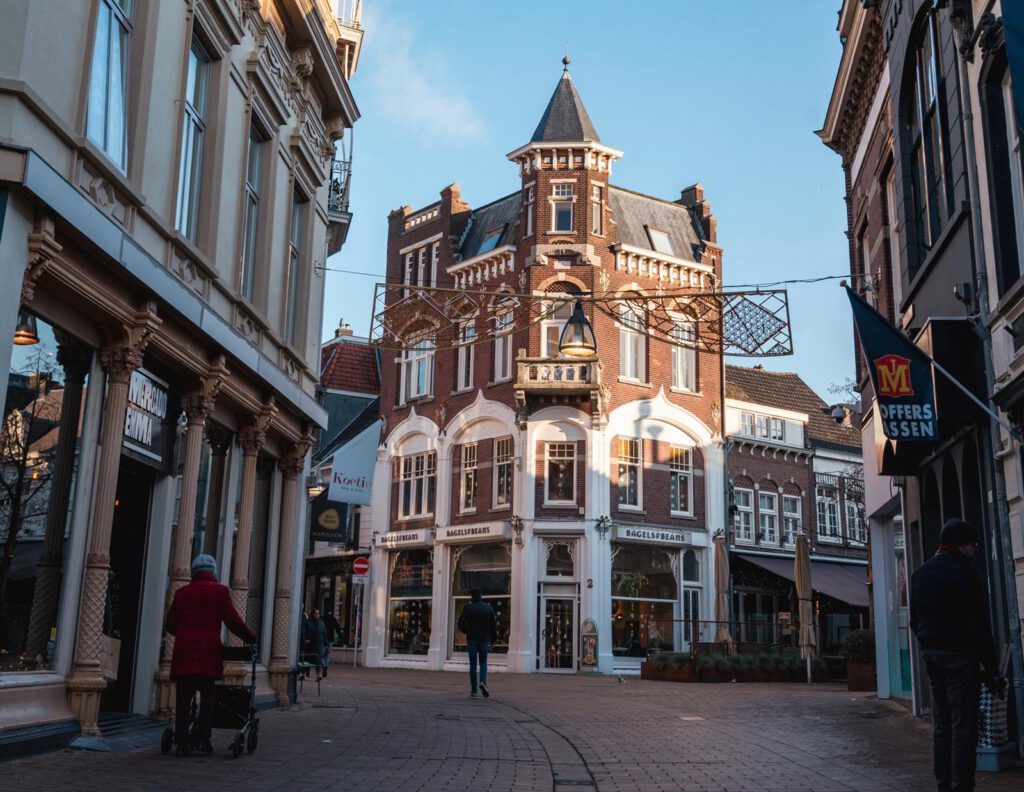
Trying to decide where to live in the Netherlands, and fancy something a little quieter than the Randstad? Consider moving to Tilburg!
Historically the wool capital of the Netherlands, Tilburg is now a transport and logistics hub with a booming start-up scene. In recent years, the municipality has invested significantly in redeveloping disused train yards and warehouses around the central railway station, giving rise to an edgy urban landscape — while simultaneously preserving the cultural and industrial heritage that defines the city.
You’ll never be out of things to do in this city. There’s plenty of culture, art, museums and music, but Tilburg is also one of the greenest cities in the Netherlands, with lots of lovely parks and forests to walk and picnic in.
In addition, many of Tilburg’s street corners hold surprises: grey walls have been transformed into vivid street art, adding to the urban charm of the city.
Unlike in the Randstad, there’s still space to expand in Tilburg, and housing is still relatively affordable — meaning you’re less likely to have to spend your life savings on a shoebox-sized basement room without windows.
Haarlem: the best of all worlds
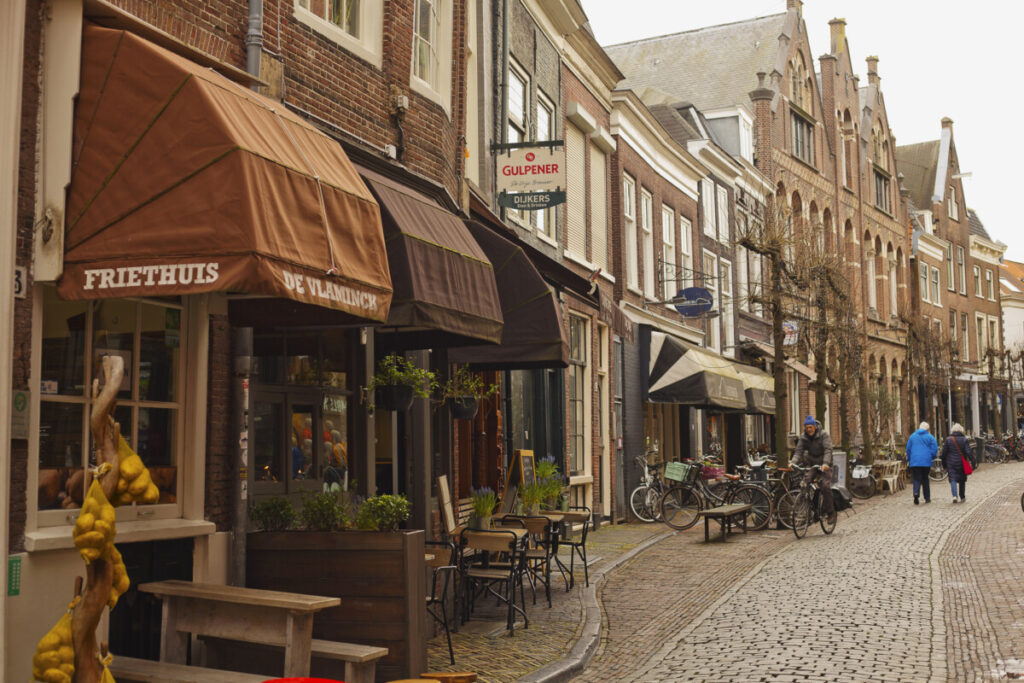
Haarlem is commonly considered one of the most beautiful and historic cities in the Netherlands, dating all the way back to 1245. It’s a compact city with a great old-world charm. Thanks to its idyllic location on the banks of the river Spaarne, its narrow cobbled streets, and weekly markets, Haarlem has a cosy, village-like vibe.
This tranquil city is becoming an increasingly popular destination for internationals. It’s also particularly family-friendly, bubbling over with events and activities for children. Haarlem is the second-largest city in the Amsterdam metropolitan area, and an easy commute to the capital.
Another great thing about Haarlem is that you’ll never get cabin fever. The seaside towns Bloemendaal aan Zee and Zandvoort will basically be in your backyard. Are woodlands more your thing? Haarlem has two gorgeous urban forests, and the Zuid-Kennemerland National Park is a perfect spot for cycling, running, and enjoying the outdoors.
The city also lies in the gateway to the flower-growing region — just bike for 15 minutes, and you’ll be surrounded by millions of colourful tulips. 💐
Maastricht: a buzzing student city in the south
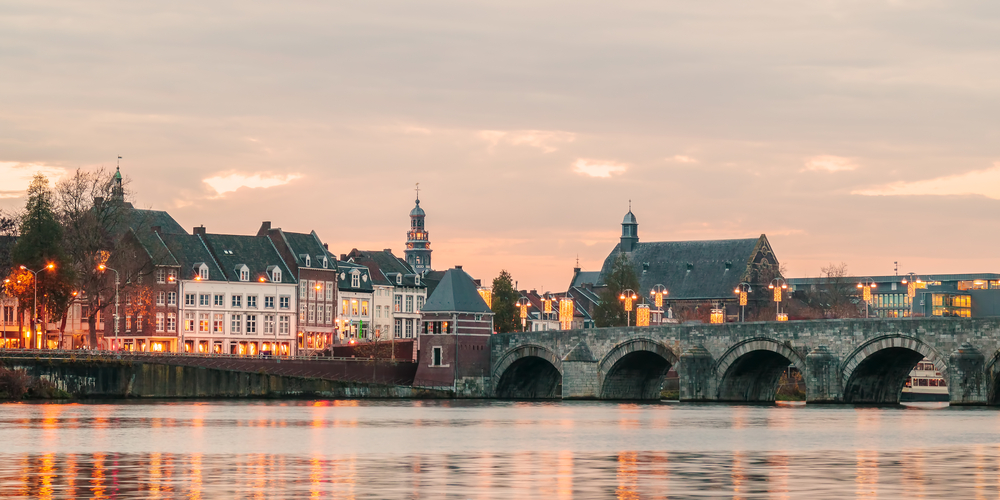
Located on the southern tip of the Netherlands, Maastricht is distinguished by its medieval architecture and vibrant cultural scene. The city has 1,677 national heritage buildings, the second-highest number in the Netherlands, after Amsterdam. With its cobbled old town, walking through Maastricht is like stepping into a fairy tale. 🧚
READ MORE | A day trip to Maastricht: what to see, do, and eat
From cute cafes to medieval history and converted Gothic buildings, living in Maastricht is a treat for the senses. And amazingly, the city even has hills! Needless to say, it’s a popular destination for people wanting to picnic, walk, and cycle.
READ MORE | Why is the Netherlands so flat? The complete explanation
Thanks to its central location in Europe, Maastricht has a very cosmopolitan feel, and is a great base for those who love to travel. Keep in mind, however, that the city will be more open to you if you speak Dutch, and job opportunities will be more readily available.
Groningen: the gem of the north
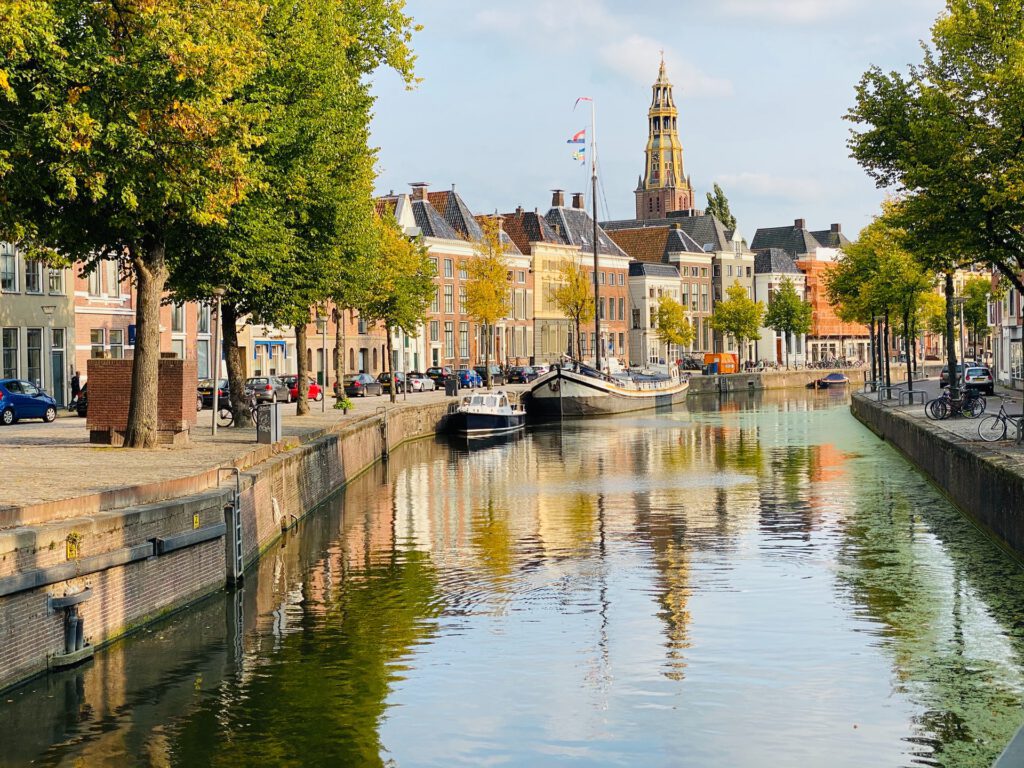
Whenever I mention Groningen, Dutchies always say, “that’s so far away!”. In reality, Groningen is just two and a half hours by train from Amsterdam — and it’s a beautiful train ride too!
It’s the largest city in the north of the country, and boasts a huge student population, making it young, diverse and fun. This vibrant city has been a major player since the late Middle Ages, with gorgeous buildings, such as the Martinitoren as proof.
READ MORE | 8 things you didn’t know about Groningen
Situated outside of the Randstad, Groningen is an ecosystem in and of itself. There are loads of cultural events, and with all those students, Groningen’s nightlife is unparalleled. It has the freshest air in the Netherlands, and the weekly farmers market at the Vismarkt is a beloved favourite among residents of Groningen.
While it can be a bit hard to find a job without speaking Dutch, and it’s also a bit of a trek to the other main cities and Schiphol Airport, housing prices are much cheaper here than in Randstad.
Arnhem: nearby gorgeous nature
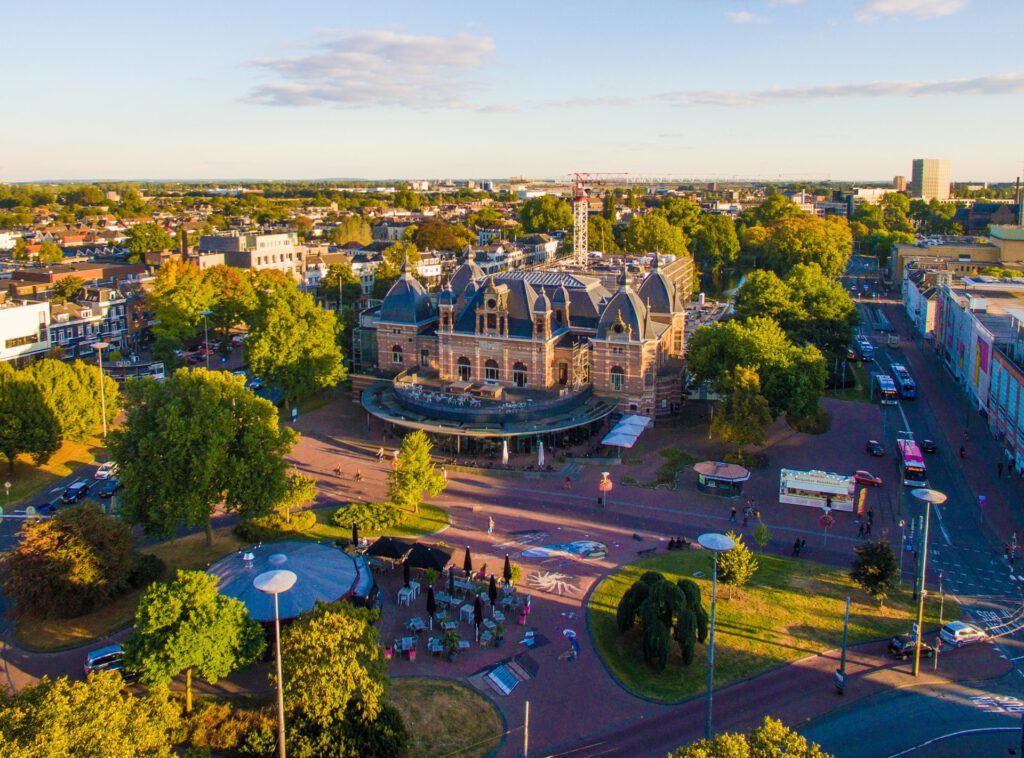
Situated on the banks of the Lower Rhine, Arnhem is the provincial capital of Gelderland in the east of the Netherlands.
If proximity to nature is key when deciding where to live in the Netherlands, then Arnhem is for you. There are plenty of beautiful places to cycle and walk around the city. A highlight is the gorgeous Veluwezoom National Park which encompasses 11,362 acres of forest, full of cycle paths and woodland trails.
With a smaller international community than those in the Randstad, there are fewer social groups and activities targeted toward non-Dutch speakers — so it can be a bit lonely for freshly arrived internationals.
Fortunately, Arnhem is within easy reach of Utrecht, which has more to offer in terms of cultural and social activities. Arnhem, however, is a much cheaper city to live in than the rest of those in the area.
Nijmegen: the oldest city in the Netherlands
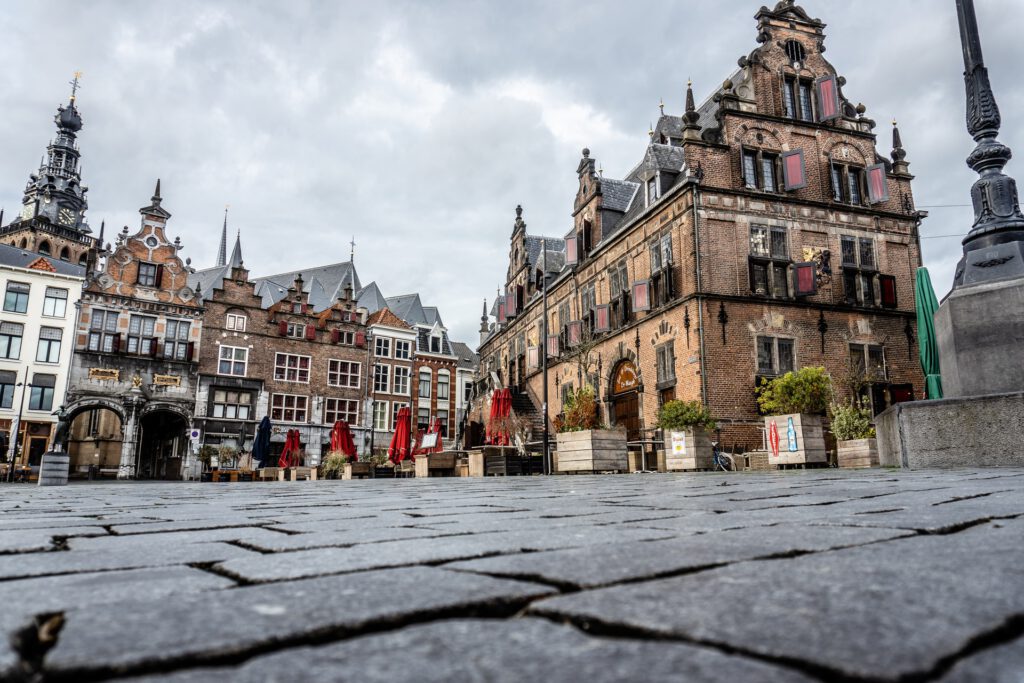
Nijmegen, also in the province of Gelderland, is the oldest city in the Netherlands — dating back to Roman times. In 2005, this ancient city celebrated 2,000 years of existence.
Cosy Nijmegen has lots of students and starters, making for a vibrant atmosphere. Although the city’s compact medieval centre has lots of bars and organised activities, you may find it a little harder to settle here if you don’t speak Dutch.
Nevertheless, the city offers much better value for money in terms of housing than those in the Randstad region, making it an attractive option.
Hilversum: a perfect base for commuters
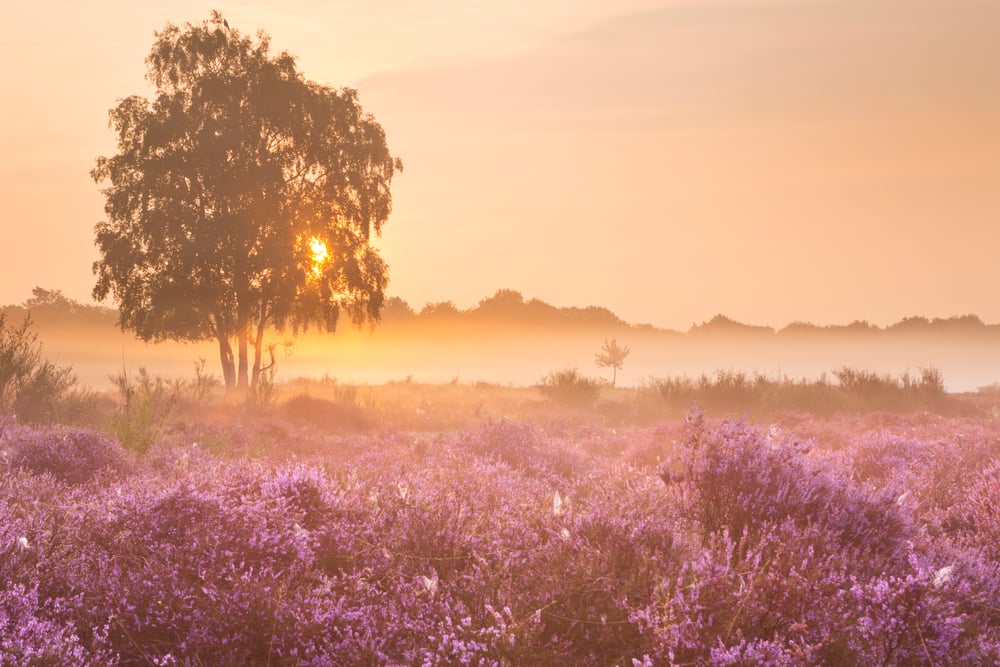
Hilversum is an affluent town in the southeast of Amsterdam, part of both the Randstad and the Amsterdam metropolitan area. It’s surrounded by nature reserves, lakes, woods, and meadows — making it very popular, and a perfect spot for those who work in the city but want to live in a green, leafy environment.
READ MORE | 7 places to live near Amsterdam: the ultimate guide
The city lies within easy commuting distance of both Amsterdam and Utrecht, with great road and train connections. However, be warned: the roads between Hilversum and Amsterdam are some of the busiest in the Netherlands at rush hour.
Hilversum is a fairly sleepy city, with all the amenities you could want and need: shopping, swimming pools, cinemas, bars, and restaurants. Several big companies have their European headquarters in Hilversum (like Nike), and (in true Dutch style), it’s home to its own international school.
The city has all of the perks of the Randstad, with additional peace and tranquillity.
Amersfoort: quaint and well-connected
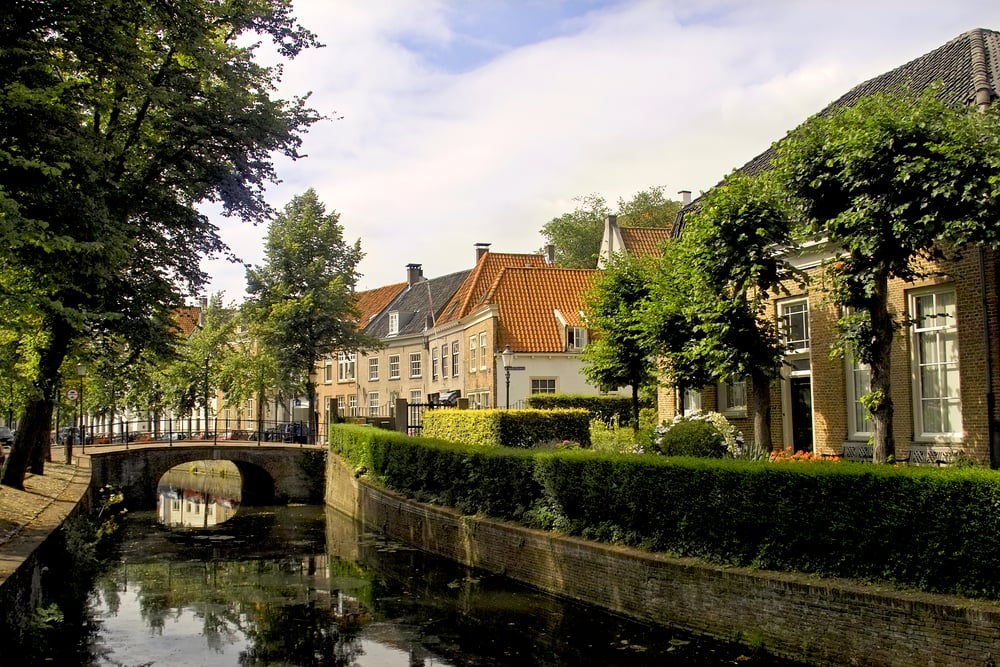
Amersfoort, in the province of Utrecht, is a major city in its own right, without being too big and overcrowded.
Large parts of the ancient city wall are still standing, including the Kopelpoort — the imposing city gate — while the medieval city centre radiates charm. The city has a relaxed atmosphere and lots of festivities. It’s also an ideal base for commuting, if you work elsewhere in the Randstad.
READ MORE | The perfect daytrip: 4 things to do in Amersfoort
Because of its close proximity to major cities, however, renting and buying houses in Amersfoort isn’t the cheapest. Nevertheless, it’s a very child-friendly place, within easy reach of great international schools and mainstream Dutch schools.
Almere: Living on reclaimed land
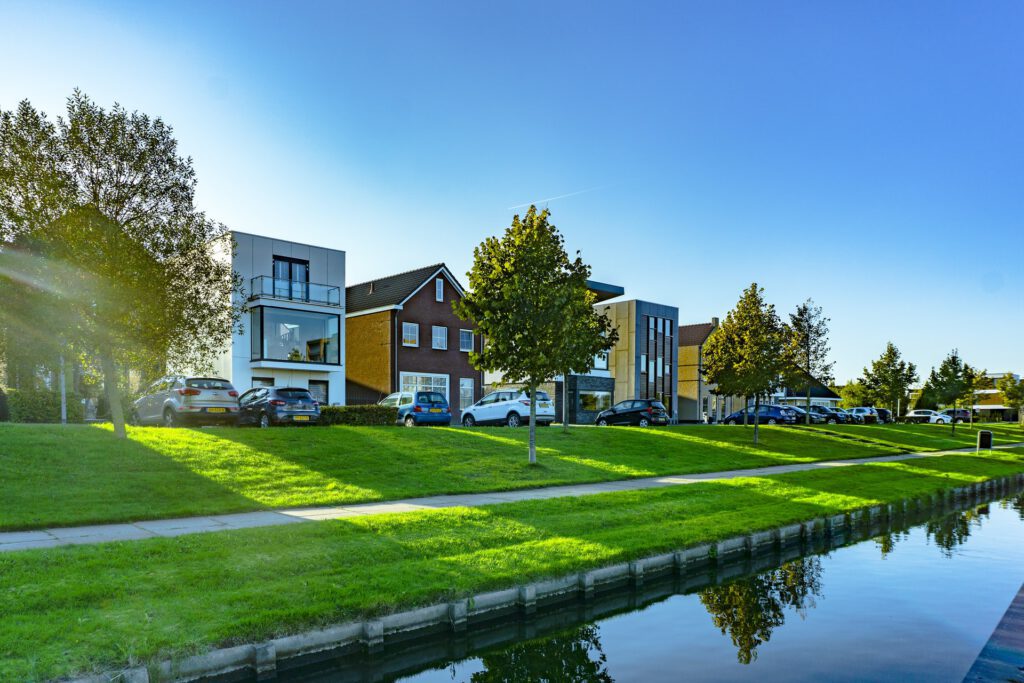
Almere is the newest city in the Netherlands, with the unique selling point that the land on which it sits was reclaimed from the Ijsselmeer lake between 1959 and 1968. Being so new, Almere is a purpose-built city with spacious and carefully planned residential areas, gardens, playgrounds, and off-street parking. You can even design and build your own home — a rare option in the Netherlands.
With loads of woodlands, parks and beaches, and a good selection of schools (including an international school), Almere is perfect for young families. The city boasts modern architecture and amenities.
READ MORE | 7 Dutch cities to move to right now (recommended by mortgage experts)
With excellent public transport links, it’s an easy commute to Amsterdam, just 20 minutes away by train.
The downside is that some may find that Almere lacks that old-world Dutch charm and personality, being a very new place. In addition, the international community is still growing, so it might be a bit harder to meet people here. Nevertheless, the city is growing in popularity with both internationals and Dutchies alike.
Living in a Dutch village
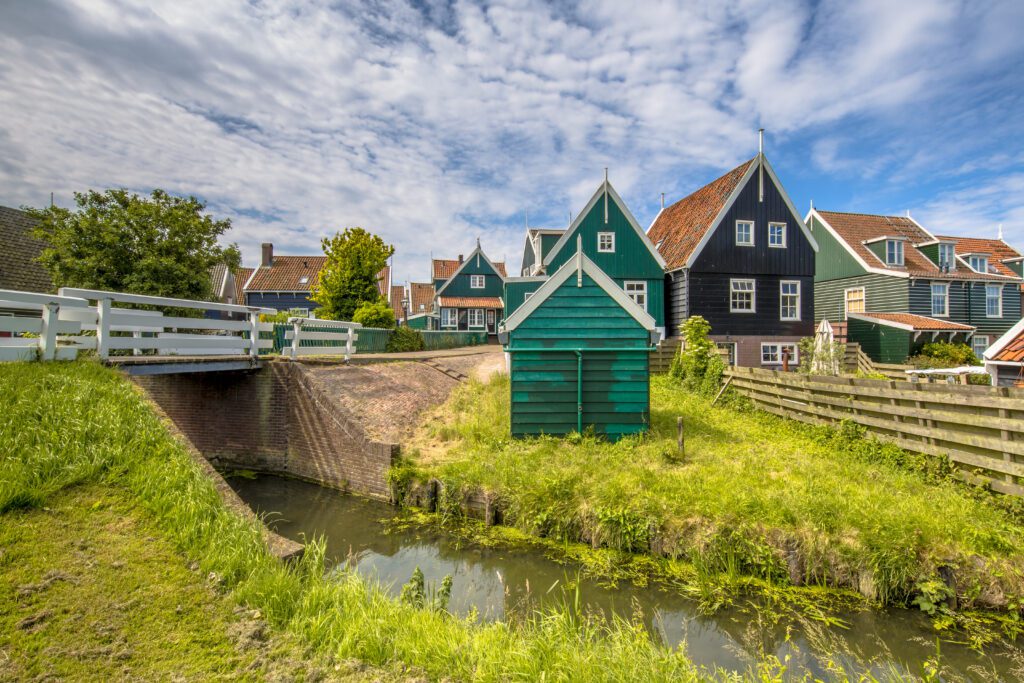
City life isn’t for everyone, and with the cutthroat housing market in Dutch cities, it’s also worth considering living in a village in the surrounding area of some of the main Dutch cities. There are both pros and cons to this.
You generally get more bang for your buck when buying and renting outside the cities — think bigger, cheaper houses, and the luxury of not hearing what your neighbours are up to throughout the day.
READ MORE | Tired of Dutch cities? 5 reasons to consider moving to ‘the country’
It’s also possible that village life might be more community-oriented, and less anonymous than life in the cities. In lush surroundings, you’ll be able to enjoy a calmer pace of life.
We’ve got to warn you, though, that there’s a strong chance that less English will be spoken, making it a little harder to integrate. Villages also have fewer amenities, so if you’re after an active nightlife or early morning trips to boutique yoga studios, this option might not be for you.
Wherever you choose to settle in the Netherlands, you’ll be relatively close to amenities, green spaces, and cultural sites.
While the housing crisis in all of the major cities can make finding your feet tricky, there are tips and tricks to make things a little easier. So, now that you know where to live in the Netherlands: pack your bags and get ready for your Dutch adventure! Success!
Which Dutch city will you be moving to? Tell us in the comments below!






I’ve lived in Leiden for almost 5 years. Then left the Netherlands for 3 years. Since a couple months I live in the NL again, this time in The Hague. I don’t like The Hague. I can’t wait to move back to Leiden soon – an intelligent, academic, young and old, small and cozy city!
Hi, I am an expat thinking of moving to Holland, and I wonder: Why nothing about Eindhoven, Maastricht, Groningen (I don’t know if there are any other major cities in the Netherlands)?
Those cities (Maastricht and Groningen at least) are kind of far from any other big cities. So if you work there, you either live in that city, or in the countryside.
I am considering a job in the Hague. The salary is good but I want to save a lot of money while there and some people are saying it’s impossible. Isn’t there some low cost option of some kind? Like having roommates, or renting a room in somebody’s house or something? I’m also a very experienced tutor, what about finding some well off family to tutor their kids? Or air BNB? Could a Dutch person give me some insight maybe?
Near Amsterdam, cheaper than Amstelveen, lots of green and water and wildlife, young population (lots of children means lots of schools, activities, etc.), contemporary and experimental architecture: Almere.
You mention to avoid leidsche rijn in Utrecht. I was just wondering why you have said this and what criteria you used to make this statement? I live here and it is very family friendly nice housing and only a 15 minutes cycle to the city centre. I think it is a great place for expat families to settle. I understand everyone has their own opinions but would be great if you could expand on why it is the place to avoid in Utrecht.
Thank you
Hi,
We would like to move to Netherlands. My son should go to kindergarden , Which city is the best ? I mean highly educated people and originally British or Dutch?
Warm regards
I have lived in Australia since 1985, born and bred in Amsterdam.
I remember in my teens being on holidays between Steenwijk & Meppel. I could live there!
My husband and I will be moving to Amsterdam in two months. He works inAmsterdam and My job is in Hague. I was wondering where is the best place in between these two cities to live. Easy for both of us to commute to work. Any suggestions?
I am in the same boat as you, because my work location is both Amsterdam and Den Haag. So, I am thinking to get a house in Leiden which is between both cities. You too.an have a look.
I lived in Wassenaar for almost 7 years. We chose it becasue it was a nice, friendly place and with two school age children, the bus to the American school was convenient and a plentiful supply of American playmates.. My youngest went to both the peuterschul and the kleuterschul before moving on to the American school of the Hague. My husband’s job was close to Wassenaar- in Nordwijk. Both my children became fluent in Dutch as did I. We’ve often thought it would be nice to go back, but its not in the cards. The shopping street were close to the house and the shopkeepers and I helped each other with language.
Couldn’t find anything about schools. I think that is an even greater consideration than work place because you don’t want to switch schools in between the 20 years. Does anyone know a good article about the best schools in the Netherlands?
i agree with your point. I will like to know what criteria was used for this.
Go east,Arnhem or further east to the Achterhoek.
There is life beyond Amsterdam, beautiful countryside ,wildlife ,great place to bring up kids.
How is Leidsche Rijn? To live in ?
HAGUE IS THE PLACE IN NETHERLANDS THAT I WISH TO LIVE FOR MY ENTIRE LIFE
WILL START ON MY PAPER WORK SOON AND CAN NOT WAIT…
Does anyone know where is the best city for sport oriented job as coach or P.E. teacher?
thanks.
Sports centre Papendal in Arnhem is where high level sports people train, and home to Dutch sports organisation NOC*NSF. I have no personal knowledge of the area, but it seems like a good place to aim for.
I think you’re not accurate with Nijmegen being a budget friendly city. It is one of the most expensive cities in NL, with a very high demand. And annoyingly tight market. Prices in Nijmegen are comparable with Rotterdam prices. And Rotterdam prices are around E850 cold for 30-50sqm. Also, you don’t require any more Dutch than in f.e. Utrecht. What is true though is that f.e. in the regional cities you do find less non-Dutch speaking waiters etc. It’s a city with a specific vibe and it’s very much in fashion. I won’t be moving back though.
Any thoughts on easier places to rent/buy with pets (2 dogs, 1 cat….and a horse I’ll need to board at a stable) near Hoofddorp? I’m from the US and a 45 min commute doesn’t worry me, but I would love to live in/close by a smaller city or town than Amsterdam or Haarlem which I have heard is horrid to find a pet friendly place! Thanks!